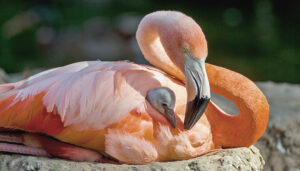By Dr. Beth Leermakers
Like human dads, animal dads vary widely in their parental engagement. Some male animals — like lions — have very little, if any, involvement with their offspring, while others share equally in childcare responsibilities. Male seahorses take their Mr. Mom role to the extreme; they accept the eggs, fertilize them and carry the eggs to term. The seahorse is the only animal where the male becomes truly pregnant.
In celebration of Father’s Day, I’ll spotlight several remarkable bird dads who do a lot more than just “help” with the kids — and a primate that may have selfish motives for handling the kids.

Photo courtesy of Sir Edmund Gin
Flamingo dads: feminists. Male flamingoes play an equal role in caring for their offspring. After mating, these monogamous birds help the mother choose a nesting site and build the nest mound out of mud, small stones, straw and feathers. After she lays her egg, the male and female take turns incubating the egg by sitting on top of the nest mound, and lifting and turning the egg with their bill. One study found males spent more time than females sitting on the nest and near it and were more aggressive toward other flamingos — when they were near the nest and sitting on it — than females. The researchers concluded male flamingos seem to be more involved in incubating the egg and protecting the nest. After the baby is born, dad and mom divide all parenting duties equally. Dad even produces “milk” (a secretion of the upper digestive tract) to feed his offspring.
Sand grouse: Frequent flyers. Sand grouse live in Africa and Asia in hot deserts where water is extremely scarce. To provide water for his babies — who cannot fly for the first 6-8 weeks — the sand grouse dad flies up to 75 miles round trip per day to a watering hole. He wades in up to his belly and rocks side to side, shaking his super-absorbent belly feathers in the water to soak up 2 tablespoons of water — a process that can take 15 minutes. Back at the nest, the thirsty sandgrouse chicks crowd around dad and use their bills like tiny squeegees, “milking” their father’s belly feathers for the much-needed water.
Emperor penguins: a 2-month incubation fast. Emperor penguin chicks are born in the Antarctic in winter, when temperatures can drop to minus 100 degrees F.
Female penguins lay one egg at a time. Because her egg would freeze in the open air, mom passes her egg to her partner’s brood pouch — an insulated pouch between his feet, just below his belly — right after she lays it. If either parent drops the egg, it will die within moments of touching the frozen ground.
After transferring the egg to her partner, the female leaves for about two months to hunt for food. During this time, the male penguin doesn’t move or eat; he may lose up to half his body weight. If the baby is born while mom is away, dad feeds it a special “milk,” produced by glands in his throat. After mom returns, dad carefully transfers the chick to mom’s brood pouch — by touching toes with her and nudging the chick from his pouch to hers — and then goes to sea to find food.
Barbary macaques: Great dads or ulterior motives? These male monkeys form close bonds with, and care for, infants. Males often carry babies on their back through the forest, but this behavior may be self-serving rather than a sign of paternal affection. Barbary macaques live in large social groups with a strict hierarchy. Every monkey knows his or her place in the group. Everyone wants to hold or carry the babies. When they’re carrying a baby, a macaque may be allowed to do something he couldn’t normally do — like sit close to dominant group members.
The infants are status symbols that help adult males build social networks and alliances within the troop. Carrying an infant breaks the ice, making it easier for the adults to approach other males and spend time with them.
They also use the babies to de-escalate aggressive interactions. To defuse tense moments, the monkey often grabs a nearby baby to hold and sometimes offer to the aggressor. By handling babies, Barbary macaques also earn social points with female Barbary macaques, increasing their future chances of mating with them. Look at what a good father I am!
Happy Father’s Day to dads everywhere — whether your “kids” are people, animals or both!
